Did you know that the average daily cost for a mid-range trip to Barbados is around $671 in local currency? Understanding the Barbadian Dollar and exchange rates can save you time and money during your stay.
Before you go, make sure to check live market rates. This helps you plan your budget and avoid unnecessary fees. Services like travel money cards can lock in better rates, saving you up to 3% on transactions.
Knowing the Barbadian Dollar denominations and payment options ensures a smooth experience. Whether you’re dining out or visiting attractions, being prepared makes your trip stress-free.
Introduction: Why Currencies and Payments Matter in Barbados
Understanding how to manage your money abroad can make or break your travel experience. From hidden fees to fluctuating exchange rates, financial planning is essential for a smooth journey. This guide will help you navigate these challenges with confidence.
Setting the Stage for a Hassle-Free Experience
When traveling, unexpected costs can quickly add up. Dynamic currency conversion, for example, often leads to higher charges. By knowing your options, you can avoid these pitfalls and keep your budget intact.
What You Will Learn in This Guide
This guide covers everything from understanding exchange rates to choosing the best payment methods. You’ll learn how to:
- Plan your currency exchange before your trip.
- Use cards and cash effectively during your stay.
- Avoid unnecessary fees and save money.
“Being prepared with the right financial tools ensures you can focus on enjoying your travel.”
With these insights, you’ll be ready to make the most of your trip without worrying about money matters. Let’s dive in and simplify your financial planning process!
Understanding the Barbadian Dollar and Exchange Rates
The Barbadian Dollar (BBD) is the official currency, offering stability for travelers. Pegged to the US Dollar at a fixed rate of 2 BBD to 1 USD, it ensures predictable exchange values. This makes budgeting easier and reduces surprises during your trip.
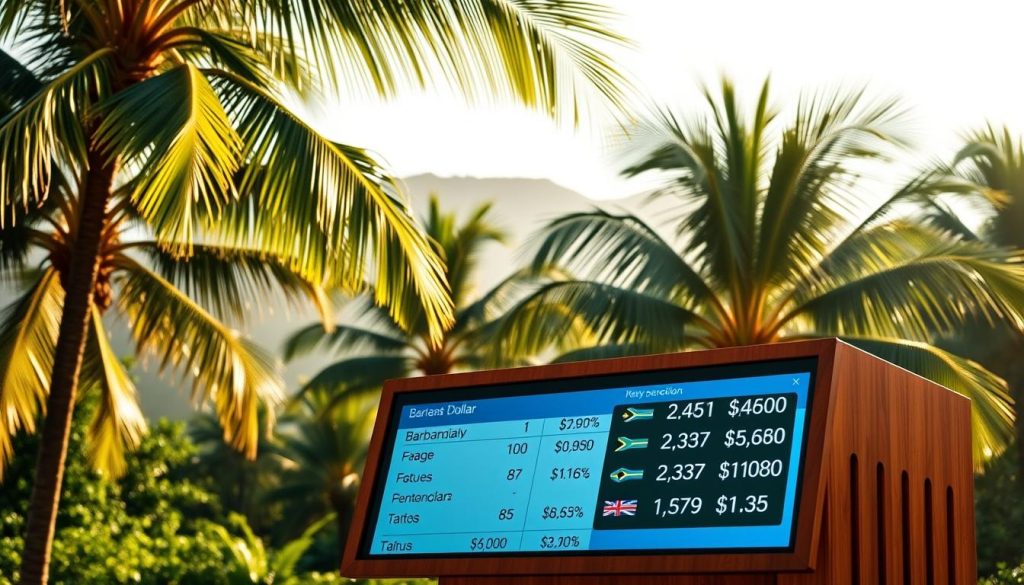
What is the Barbadian Dollar (BBD)?
Introduced in 1935, the BBD is the primary way to pay for goods and services locally. It’s widely accepted, though US Dollars are also used in tourist areas. Keep in mind that change is often given in BBD, so having some local cash is handy.
Tracking the USD/BBD Mid-Market Rate
The mid-market rate is the benchmark for fair exchange deals. It’s the rate you’ll see online, but providers often add fees. To get the best deal, compare rates at ATMs, banks, and authorized bureaus. This simple step can save you money.
Here are some practical tips:
- Always check the mid-market rate before exchanging money.
- Use ATMs for better rates, but watch for withdrawal fees.
- Carry a mix of cash and cards for flexibility.
“Knowing the local currency and exchange rates ensures you’re always prepared, no matter where your travels take you.”
By understanding the BBD and tracking exchange rates, you’ll navigate your trip with confidence. This knowledge helps you avoid unnecessary fees and make the most of your budget.
Pre-Trip Currency Planning and Exchanging Strategies
Smart travelers know that pre-trip currency planning is key to a smooth journey. By exchanging your dollar to BBD before departure, you can secure better rates and avoid unnecessary stress. This guide will walk you through the best strategies to save time and money.
Benefits of Exchanging USD to BBD Before Departure
Exchanging your dollar before your trip offers several advantages. You’ll often get better rates at local banks or authorized bureaus compared to last-minute options. This simple step ensures you’re prepared with local cash for immediate expenses like transportation or meals.
Here’s why planning ahead pays off:
- Better exchange rates than airport kiosks.
- Less time spent searching for currency exchange spots upon arrival.
- Peace of mind knowing you’re financially prepared.
Avoiding Expensive Airport Exchange Options
Airport exchanges are convenient but often come with higher fees and less favorable rates. These kiosks cater to last-minute travelers, which means they can charge more. By exchanging your dollar in advance, you avoid these extra costs and keep your budget intact.
Here’s a quick comparison of exchange options:
| Option | Exchange Rate | Fees |
|---|---|---|
| Local Banks | Best | Low |
| Authorized Bureaus | Good | Moderate |
| Airport Kiosks | Least Favorable | High |
By following this guide, you’ll have the information needed to make smart financial decisions. Pre-trip planning ensures you’re ready to enjoy your journey without worrying about currency hassles.
Payment Methods in Barbados: Cash, Card, and More
Managing your money effectively while traveling can make all the difference in your experience. Knowing when to use cash or card ensures smooth transactions and helps you avoid unnecessary fees. This section breaks down the best options for payments, so you can plan your spending wisely.
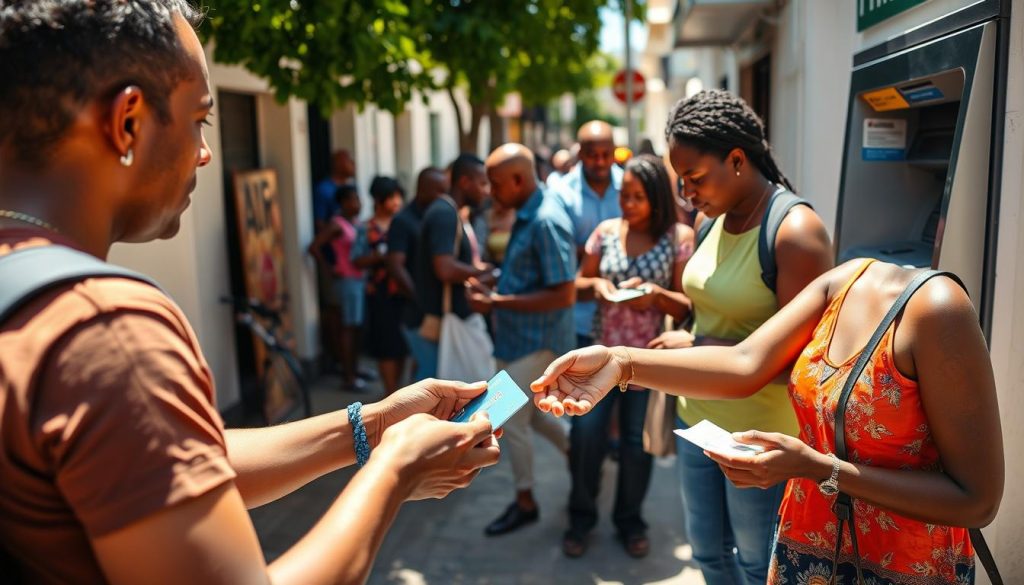
When to Use Cash for Small Purchases and Tips
Cash is the go-to option for small purchases and tipping. Local markets, street vendors, and smaller businesses often prefer cash payments. It’s also the best way to show appreciation for services, as tipping is usually done in cash. Carrying small denominations ensures you’re always prepared.
Here’s why cash is essential:
- Accepted everywhere, even in remote areas.
- Convenient for tipping, with 10% being the standard.
- Helps you stick to your budget for daily expenses.
Leveraging Card Payments in Hotels and Major Stores
Cards are widely accepted in hotels, restaurants, and larger stores. They’re a secure and convenient option for bigger purchases. Many establishments also offer contactless payments, making transactions quick and hassle-free. Always check for foreign transaction fees to avoid unexpected charges.
Here’s how to use cards effectively:
- Use them for accommodations, dining, and shopping.
- Check your card’s international acceptance before traveling.
- Keep some cash as a backup for places that don’t accept cards.
“Having the right mix of cash and card ensures you’re ready for any situation, making your trip stress-free.”
By understanding these payment options, you can plan your spending strategy and enjoy a seamless experience. Whether you’re exploring local markets or relaxing at a hotel, being prepared makes all the difference.
Dynamic Currency Conversion and Fee Avoidance Tactics
When traveling abroad, understanding how to avoid extra fees can save you a significant amount of money. One common thing to watch out for is dynamic currency conversion (DCC). This service, often offered at merchants, allows you to pay in your home currency but usually comes with unfavorable rates and hidden fees.
Identifying Dynamic Currency Conversion at Merchants
DCC is frequently offered at restaurants, shops, and even ATMs. When you’re asked if you’d like to pay in your home currency, it’s a sign that DCC is being applied. While it might seem convenient, this thing often results in higher costs due to poor exchange rates and additional fees.
Here’s how to spot DCC:
- You’re prompted to choose between your home currency and the local one.
- The receipt shows the amount in both currencies.
- The exchange rate used is noticeably worse than the mid-market rate.
How to Sidestep Hidden Transaction Fees
To avoid unnecessary charges, always choose to pay in the local currency. This ensures you get the best possible rate and avoid extra fees. For example, when using your card at a restaurant, simply request to be charged in the local currency. This small step can save you money on every transaction.
Here’s a comparison of DCC vs. local currency charges:
| Option | Exchange Rate | Fees |
|---|---|---|
| Dynamic Currency Conversion (DCC) | Less Favorable | High |
| Local Currency | Best | Low |
“Choosing to pay in the local currency is one of the simplest ways to save money while traveling. It ensures you’re not overpaying due to hidden fees.”
By being aware of DCC and opting for local currency, you can make smarter financial decisions in any country. This approach not only saves you money but also makes your travel experience smoother and more enjoyable.
Barbados: Ultimate Travelers Guide to Currencies & Payments
Managing your finances effectively while traveling ensures a stress-free and enjoyable experience. One of the best ways to stay on top of your spending is by using a dedicated debit card or travel money card. These tools help you avoid unnecessary fees and keep your budget in check.
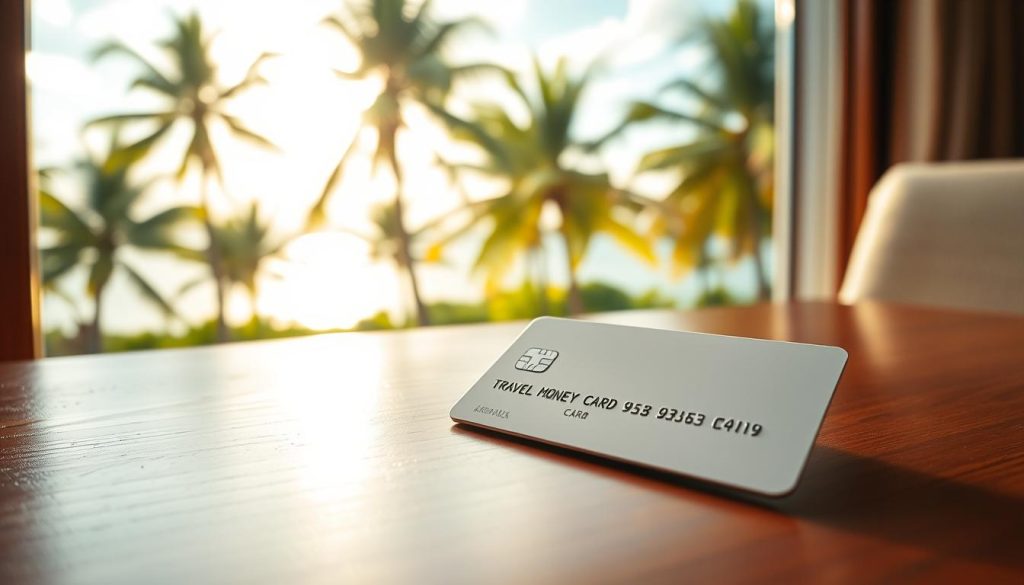
When you arrive at your destination, having a reliable payment method is essential. A travel money card allows you to lock in favorable exchange rates, saving you money on every transaction. Plus, it minimizes the risk of hidden foreign transaction fees that can quickly add up.
Why a Dedicated Debit Card is a Smart Choice
Using a dedicated debit card for your trip offers several advantages. First, it separates your travel funds from your primary account, making it easier to track expenses. Second, many cards offer low or no foreign transaction fees, which can save you a significant amount over time.
Here’s how to make the most of your card:
- Choose a card with no foreign transaction fees.
- Load it with the local currency to avoid conversion charges.
- Monitor your spending to stay within your budget.
Setting and Monitoring Your Budget
Creating a clear budget before your trip helps you avoid overspending. Start by estimating daily expenses like meals, transportation, and activities. Use your travel money card to track purchases in real-time, ensuring you stay on track.
“A well-planned budget and the right payment tools can make your trip smoother and more enjoyable.”
By following these tips, you’ll have the financial freedom to focus on what truly matters—making unforgettable memories. Whether you’re exploring local markets or dining at a fine restaurant, being prepared ensures a seamless experience.
Comparing Travel Cards for Optimal Financial Flexibility
Choosing the right travel card can significantly enhance your financial flexibility while abroad. With options like the Wise and Revolut cards, you can save on fees and manage your money more efficiently. This section compares these two popular cards, helping you decide which one suits your travel needs best.
Wise Travel Card Features and Advantages
The Wise card is a top choice for travelers due to its low fees and multi-currency capabilities. It allows you to hold and spend in over 50 currencies, making it ideal for frequent travelers. One of its standout features is the transparent fee structure, which can save you up to 88% compared to traditional banks.
Here’s why the Wise card stands out:
- Low conversion fees with real mid-market rates.
- No hidden charges for ATM withdrawals up to a monthly limit.
- Easy-to-use app for managing your funds on the go.
Revolut Card: Plans and Special Benefits
The Revolut card offers flexible plans tailored to different travel habits. Whether you’re a casual traveler or a frequent flyer, there’s a plan for you. Its premium plans include perks like travel insurance and airport lounge access, adding extra value to your trips.
Key benefits of the Revolut card include:
- Free international payments and ATM withdrawals on most plans.
- Budgeting tools to track your spending in real-time.
- Special features like cryptocurrency trading for tech-savvy users.
| Feature | Wise Card | Revolut Card |
|---|---|---|
| Currency Support | 50+ | 30+ |
| ATM Withdrawal Fees | Low | Free (on most plans) |
| Monthly Fees | None | Varies by plan |
“Selecting the right travel card ensures you’re not overpaying for fees and can focus on enjoying your trip.”
By comparing these cards, you can make an informed decision based on your travel habits. Whether you prioritize low fees or extra perks, both options offer excellent financial flexibility for your next adventure.
Managing Transactions and Minimizing Fees on the Ground
Handling your finances smoothly while traveling ensures you can focus on enjoying your trip. One of the key aspects of this is managing your payments and minimizing fees. This section provides practical tips to help you navigate ATM withdrawals and local transactions with ease.
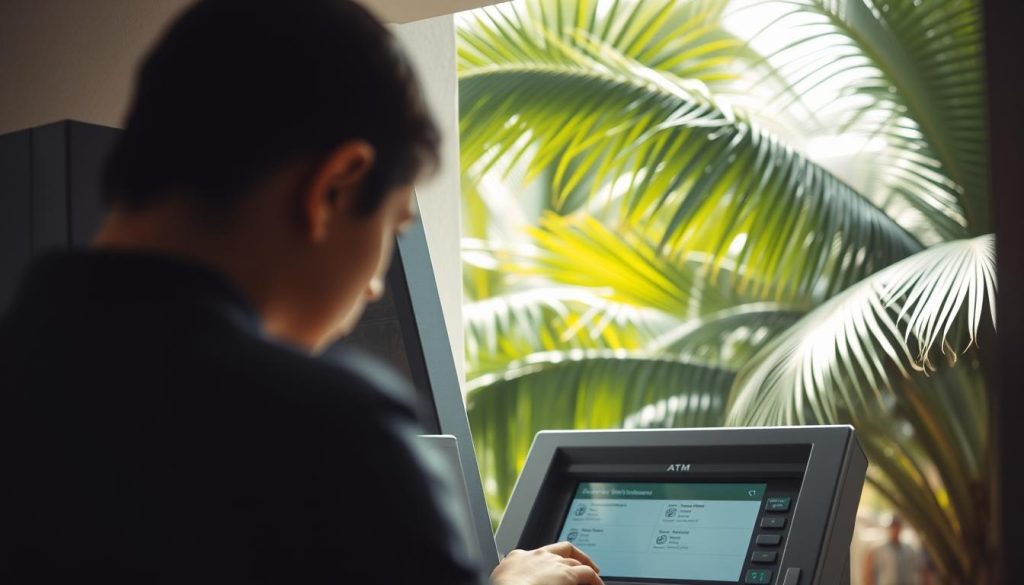
Safe ATM Withdrawals and Local Conversion Tips
Using ATMs is a convenient way to access cash, but it’s important to choose the right one. Look for ATMs affiliated with major banks to avoid high fees. Always check for skimming devices and shield your PIN for added security.
Here’s how to make the most of your withdrawals:
- Use ATMs inside banks or secure locations to reduce risks.
- Opt for larger withdrawals to minimize transaction fees.
- Check your bank’s international withdrawal policies to avoid surprises.
Managing Conversion Fees and Competitive Rates
When withdrawing cash, you may encounter currency conversion fees. To avoid unnecessary charges, always choose to be charged in the local currency. This ensures you get the best exchange rate and avoid dynamic currency conversion (DCC) fees.
Here’s a comparison of ATM fees:
| ATM Type | Withdrawal Fee | Conversion Fee |
|---|---|---|
| Bank ATMs | Low | None |
| Independent ATMs | High | Yes |
“Choosing the right ATM and managing conversion fees can save you money and make your trip stress-free.”
By following these tips, you’ll handle your payments and withdrawals efficiently. Whether you’re using a debit or credit card, being prepared ensures a seamless experience.
Smart Spending and Secure Transactions: Insider Tips
Planning your daily spending can make your trip smoother and more enjoyable. By budgeting effectively and understanding foreign transaction costs, you can avoid overspending and focus on creating lasting memories. Here’s how to manage your finances like a pro.
Budgeting Your Daily Expenses
Start by estimating your daily costs, including meals, transportation, and activities. Use a budgeting app or notebook to track your spending in real-time. This helps you stay on track and adjust your plans if needed.
Here are some practical tips:
- Set a daily spending limit and stick to it.
- Use card payments for larger purchases to keep a digital record.
- Carry cash for small expenses like tips or street vendors.
Managing Foreign Transaction Costs
Foreign transaction fees can add up quickly. To minimize these costs, choose a card with no foreign transaction fees. Always opt to pay in the local currency to avoid dynamic currency conversion charges.
Here’s a quick comparison:
| Option | Fees |
|---|---|
| Local Currency | Low |
| Dynamic Currency Conversion | High |
Using Card Payments Strategically
Cards are convenient and secure, but use them wisely. Notify your bank of your travel plans to avoid issues. For added security, enable multi-factor authentication on your accounts.
Here’s how to make the most of your cards:
- Use them for accommodations and dining to earn rewards.
- Keep a backup card in case of emergencies.
- Monitor your transactions regularly for any unauthorized charges.
“Smart spending and secure transactions ensure you can focus on enjoying your trip without financial worries.”
By following these tips, you’ll manage your money effectively and make the most of your trip. Whether you’re exploring new places or relaxing at a café, being prepared ensures a seamless experience.
Conclusion
Planning your finances before a trip can save you from unexpected costs and make your journey stress-free. Choosing the right payment method is key to reducing transaction fees and avoiding hidden charges. Always compare your options to ensure you’re getting the best rates.
Be mindful of conversion rates when exchanging money or using cards abroad. Opting for local currency can help you avoid extra fees. These small steps can add up, saving you money and making your spending more efficient.
By implementing these strategies, you’ll enjoy a smoother and more cost-effective trip. Start planning today and take control of your finances for a worry-free adventure.
The above is subject to change.
Check back often to TRAVEL.COM for the latest travel tips and deals.
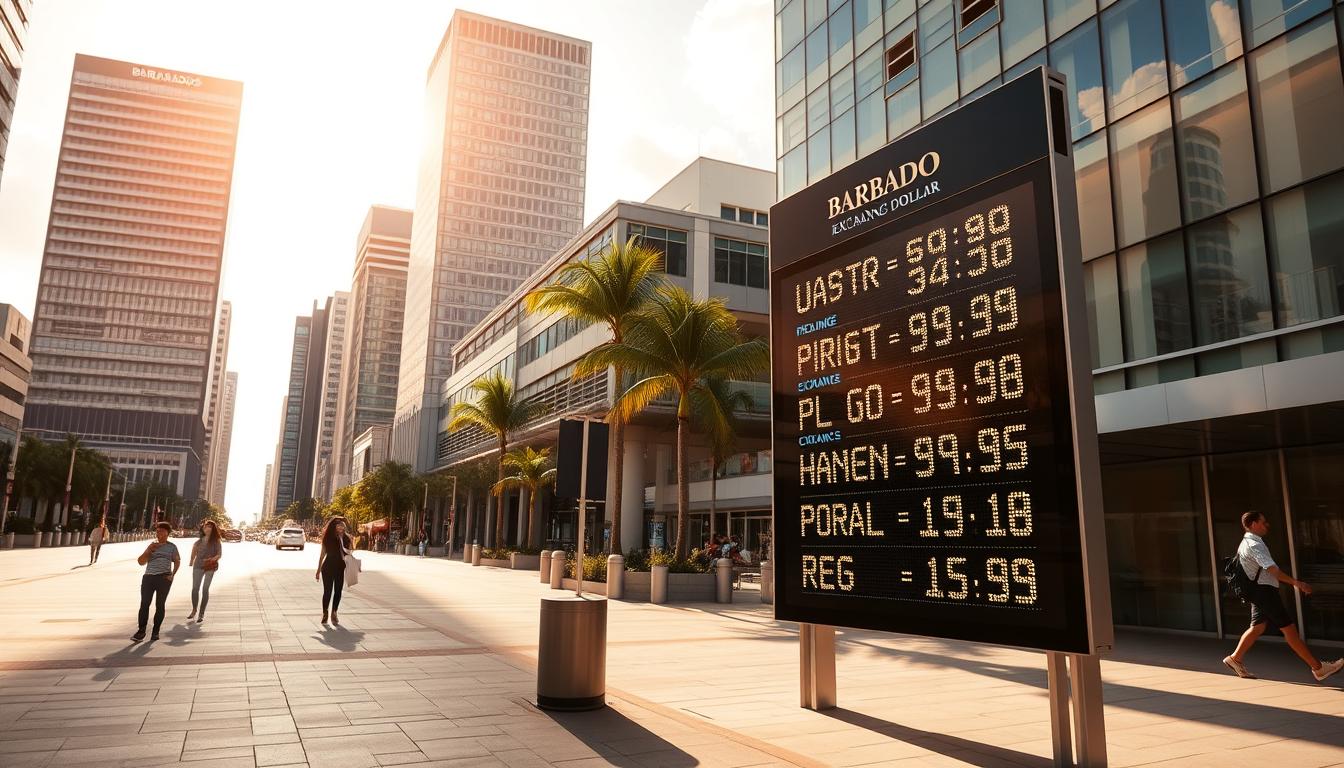
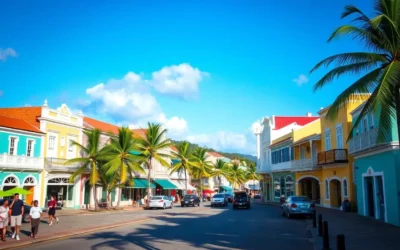


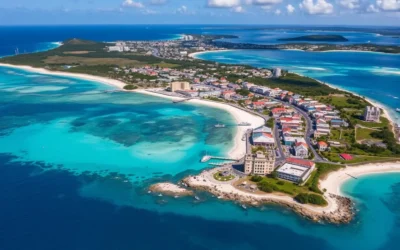

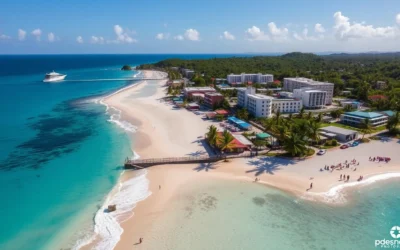
0 Comments